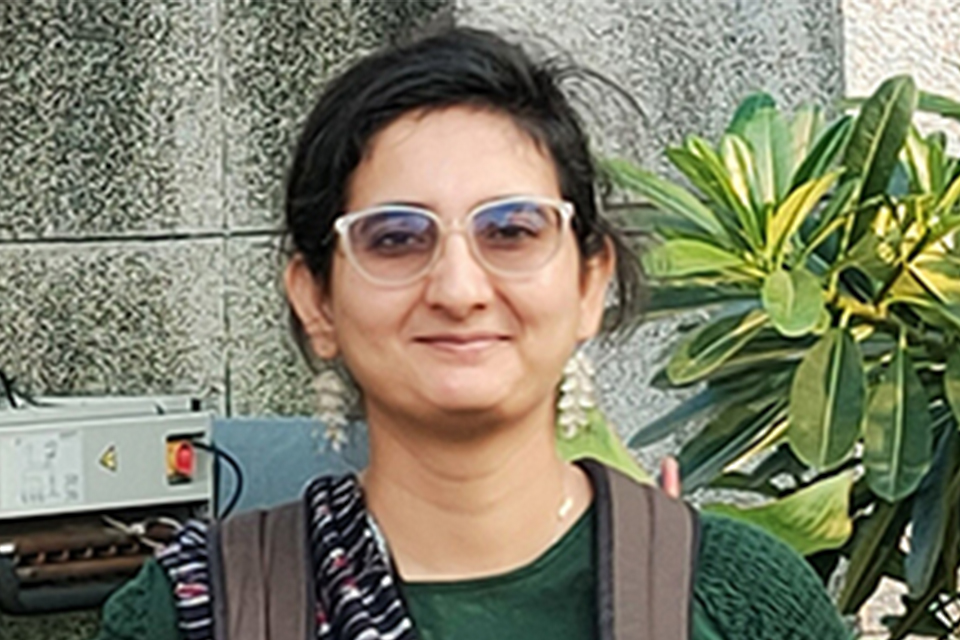Academic Details
- Assistant Professor, English and Philosophy, Department of Humanities and Social Sciences, IISER Bhopal, January 2018 - present
- Assistant Professor, Department of Philosophy, St. Stephen's College, University of Delhi, July 2015 - December 2017
- Assistant Professor, Department of Philosophy, Hindu College, University of Delhi, January 2014 - May 2015
- Licence Arts-Musique, 1er Année, Université Paris 8 Vincennes St -Denis, France, 2012-2013
- PhD, Critical Theory, University of Nottingham, UK, 2007-2012
- MA, Critical Theory and Cultural Studies, University of Nottingham, UK, 2006-2007\BA, English, Fergusson College, University of Pune, 2003-2006
Research Interests
Critical Theory
Continental Philosophy
Greek Philosophy
Modern European Philosophy
Classical Languages and Literature
Research Projects
My broad areas of specialisation are Critical Theory and Continental Philosophy. Given the transdisciplinary nature of these fields, my research draws insights from literature, philosophy, psychoanalysis, political theory, history, cultural studies, mathematics, and music. My research revolves primarily around the problem of subjectivity and action, particularly insofar as these are implicated in the political ramifications of the formation, use, and transformation of philosophical concepts. This research has branched out into three interrelated research projects that focus on different aspects of the problem.
Aleatory Dialectics
In this project I trace the development of an "aleatory dialectic" and the associated emergence of a temporal, dialectical, and revolutionary subjectivity in the interpretation of dialectical materialism proposed by Althusser and Badiou following Rousseau, Marx, and the Epicureans. The notion of materialism developed by these thinkers spatialises time, while dialectics, plural, emerge as aleatory irruptions in an atemporal regime of things. Before such evental irruptions, not only is there no such thing as time, there is nothing resembling a subject. My question here concerns that which orients the not-yet-subject to inscribe itself into ever-new (revolutionary) temporalities. At the other end of the spectrum, I also look at thinkers like Hegel and Sartre, who develop an intensional notion of the subject that finds itself embroiled in a linear time that progresses within a totalising dialectic. This version is in constant danger of undermining the revolutionary potential of the subject, whose gradual emergence is not unlike eternal stasis. Yet it is only here that we have any concept of a subject before an event. My aim is to formulate a pre-revolutionary temporality of the aleatory subject by dialectically co-ordinating these two seemingly incommensurable modes of thought.
Rebellious Subjects
Following on from the conceptual apparatus to be developed in "Aleatory Dialectics", in this project-located in the interstices between philosophy, politics, and cultural texts-I look at various works of literature, music, film, etc, in order to come up with a picture of what it means, subjectively, to rebel. Currently I am looking at a variety of texts which include Sophocles' Antigone and Bizet's Carmen, Urban Gad's Die Suffragette, Milton's Paradise Lost, and Shelley's longer poems amongst others-that are illustrative of an important aspect of the formation and dissolution of the political subject who risks taking the place of a "rebel" within a given societal structure.
Freedom (and Equality) against Liberalism
This is an ongoing project-that takes off from my doctoral research-which problematises the question of subjectivity and action by considering the tensions and contradictions between the philosophical-political concepts of freedom and equality and their use in the politics of liberalism. One aspect of this is a purely political critique, where I critically analyse the concepts of freedom and equality, the structures and institutions that make either or both impossible, and the philosophical and ideological notions that stand in support of these structures. The other is to develop and refine a concept of freedom that we can develop, if we make equality our theoretical mainstay, in order to consider the emancipatory potential that the transformation of this concept could have.
Department of Humanities and Social Science, IISER Bhopal (2018 - Present)
HSS 309/609 Logic
HSS 316/616 Philosophical Beginnings: Matter, Motion, and the Cosmos
HSS 320/620 Early Modern Philosophy: The Rationalists
HSS 624 Critiques of Power: Frankfurt School & French Antihumanism
HSS 626 Structure/Subject: Structuralism, Post-Structuralism, and Psychoanalysis
HSS 628 The Tradition of Critique: The Intellectual Background of Contemporary Critical Theory
Department of Philosophy, Hindu College & St. Stephen’s College, University of Delhi, (2014 - 17)
Early Greek Philosophy (Presocratics and Sophists)
Greek Philosophy (Plato’s Republic)
Later Greek Philosophy I (Aristotle’s Metaphysics)
Later Greek Philosophy II (Hellenistic)
History of Western Philosophy (Early Modern Period)
Continental Philosophy
Metaphysics and Epistemology
Philosophy of Language (Analytic School)
Philosophical Classics (Aristotle, Kant, Heidegger)
Readings in Western Philosophy (Plato, Rousseau, Nietzsche)
Social and Political Philosophy
Ethics: Theory and Practice
Ethics in the Public Domain
Formal Logic
Symbolic Logic
| # |
Authors |
Title |
Journals |
Year |
| Authors |
Editors |
Title |
Publisher |
Year |
Adity Singh
|
Arka Chattopadhyay
Arthur Rose
|
Badiou, Music, Novelty |
Bloomsbury |
2024 |
| Authors |
Editors |
Title |
Publisher |
Year |

 adity@iiserb.ac.in
adity@iiserb.ac.in  91 755 269 2703
91 755 269 2703